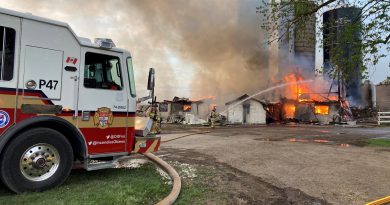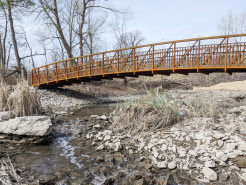OTHS becomes a leader in virtual production
Osgoode Township High School has cemented itself as a leader in animation and virtual production among North American high schools.
The school’s comm tech students entered a contest run by industry giants Tallo and Unreal Engine. Emma Smith, a Grade 11 student at OTHS, won first place with her video dealing with Climate Change inequality. She won a prize of $2,500 USD. Another OTHS Grade 11 student, Evan Cox, won second place with his video called Excessive Waste. He won a cash prize of $1,250 USD.
OTHS had the strongest showing in the contest among any high school on the continent. The comm tech program’s success is putting the school on the map both nationally and internationally.
“Two or three years ago, it would a studio a week to create a 30-second animation,” said OTHS teacher Marc Dubeau. “Now, it can be done in a high school class.”
Dubeau’s vision for the program has been groundbreaking. It began with an investment of the right computer equipment, exposure to the right platforms, and a lot of ongoing research. The result is that OTHS students are using the same tools used to create video games like Fort Nite, and the virtual production used in the Disney Plus series The Mandalorian. The actors are real people, but the backgrounds and the vehicles are all created using Unreal Engine.
“As a teacher, I want to prepare kids for the careers of today and tomorrow,” said Dubeau, “which means I needed to expose them to something they wouldn’t see in a traditional high school setting. Game engines are a direct path to that new world, as they can broaden horizons and help students make more informed decisions about where they want to go next. Unreal Engine opened a major window.”
Currently, Dubeau’s curriculum extends over a three-year program. In Grade 10, students begin learning about how 3D tools like Maya, Mixamo, and Asset Forge inform game designs. Imagine an epic battle with robots and bears, and you’re in the ballpark of what students are creating. At the same time, students begin learning editing tools like Adobe Premiere in Grade 10 and Unreal Engine in Grade 11, so by the time they reach a choose-your-own-adventure point in Grade 12, they can decide whether they’d like to specialize in games or virtual production.
Like his students, Dubeau is in a constant state of absorption, learning real-time tricks at night to keep up with an energized classroom. He considers himself to be self-taught, and has mostly figured out how to do challenging things in Unreal using the Unreal Online Learning portal and Udemy, and through various exchanges with his students. “In fact, some of my best tricks have come from things students have shared with me,” he said. “We are all learning together.”
As VR became more of a hot topic, Dubeau leapt at the chance to build it into his curriculum. After receiving initial funds from the Experiential Learning Division of the Ottawa Carleton School Board, the class created the first high-school-driven VR experience in their region—an amusing little game where players walk around with a hockey stick, softly whacking Pikachus.
Next, he applied for an Epic MegaGrant to build out the program, receiving $25,000 USD to create a new VR game for struggling students. Currently in development, the game is set on-site at OTHS and follows a time traveler who has lost his time-traveling tool (in this case, a wristwatch). Players progress by passing state-approved lessons, receiving a piece of the watch back after each successful test, until the traveler has everything he needs to return home.
While sidelined a bit by COVID-19 restrictions, the development has shown some good progress, with a dedicated team of students even incorporating a working pinball game. Behind the scenes, students are using Unreal Engine’s Blueprint visual scripting system to create the world. Since Blueprint simplifies the process of coding for non-coders, students have been able to start realizing their most ambitious ideas at a level that would have been impossible without serious C++ training. They have been supplementing this journey with a mix of tutorials and YouTube lessons, as well as the advice of Snowed In Studios, an Ottawa-based video game and immersive media development studio, that weighs in when the team is unsure how to move forward. The students hope to deliver a final game in the coming year.
Not only is he steering a new generation of artists from the ground up, he’s leaving a trail of breadcrumbs for other educators who’d like to do the same. The fruits of this labor can be found on YouTube, where curated playlists show teachers (and students) how they can start implementing basic virtual production and Unreal Engine lessons into their lives. In the last year, Dubeau has also created a Google community for middle/high school teachers in Canada and the US, which allows anyone to share what’s been helping in terms of skill development or lesson plans.
“Schools are telling me that my students know things now that they wouldn’t be taught until the second or third year of college,” he said. “This puts them in a great position for the future, as they can spend those four years gaining higher-level skill sets before they enter the real world. That way, when they hit the job market, they’re more likely to get the job they want.”






